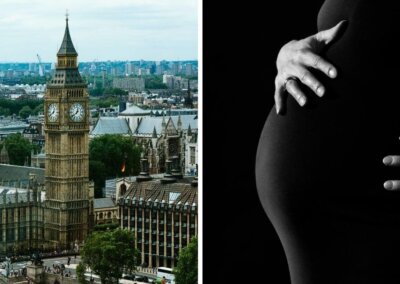MPs will be given the opportunity to vote on lowering the abortion time limit in an historic vote that is expected to take place next month.
A cross-party group of 25 MPs has tabled a landmark amendment to the Government’s flagship Criminal Justice Bill ahead of Report Stage that would lower the abortion time limit from 24 to 22 weeks in line with advances in medical science.
The group of MPs behind the amendment is led by Caroline Ansell and includes former health minister Maggie Throup, ex-shadow cabinet Labour minister MP Rachael Maskell, ex-shadow Labour minister Marie Rimmer, ex-Cabinet Minister Sir Jacob Rees-Mogg and Miriam Cates.
A 24-week abortion limit is now beyond the point when many babies survive, double that of the most common time limit among European Union countries and represents a contradiction at the heart of our abortion law.
Caroline Ansell MP, who is leading the group of 25 MPs who have tabled the amendment, said “The increase in survival rates for babies born at 22 and 23 weeks gestation is one of medical science’s great success stories in recent years. More and more babies born at these ages are able to survive thanks to the hard work of neonatal teams”.
“As in 1990, when our laws were last changed to reflect similar increases in survival rates, it is time our abortion time limit was updated. Our current time limit is an outlier compared with our European neighbours and my hope is this amendment will command widespread support across the House”.
Time to lower the abortion limit from 24 to 22 weeks
Originally set at 28 weeks, the abortion limit was lowered in 1990 to 24 weeks gestation. Improved survival rates for extremely premature babies between 24 and 28 weeks was one of the key considerations that motivated this change.
By the same logic, and informed by the improved survival rates for babies born at 22 and 23 weeks gestation, MPs are now calling for the abortion time limit to be updated.
In the decade to 2019 alone, the survival rate for extremely premature babies born at 23 weeks doubled, prompting new guidance from the British Association of Perinatal Medicine (BAPM) that enables doctors to intervene to save premature babies from 22 weeks gestation.
Research published in November 2023 by academics at the University of Leicester and Imperial College London indicates that a significant number of babies born at 22 and 23 weeks gestation can now survive outside the womb. According to this research, there were a total of 261 babies born alive at 22 and 23 weeks, before the abortion limit, who survived to discharge from hospital in 2020 and 2021.
However, according to the Government abortion statistics in 2021 alone, 755 ‘ground C’ abortions were performed when the baby was at 22 or 23 weeks gestation (ground C is the statutory ground under which the vast majority of abortions are permitted and there is currently a 24-week time limit for abortions performed under this statutory ground).
This leaves a real contradiction in British law. In one room of a hospital, doctors could be working to save a baby born alive at 23 weeks whilst, in another room of that same hospital, a doctor could perform an abortion that would end the life of a baby at the same age.
The UK abortion law is out of step with the majority of European Union countries
Our 24-week time limit is also out of step with the majority of European Union countries, where the most common time limit for abortion on demand or on broad social grounds is 12 weeks.
Countries with 12-week limits for abortion on demand or on broad social grounds include Germany, Italy and Belgium as well as the more “liberal” Nordic countries Denmark and Finland. Even Sweden has a time limit for abortion on demand or on broad social grounds that is much lower than the United Kingdom at 18 weeks.
Lowering the abortion time limit is supported by a large majority of the British public. Polling undertaken by Savanta ComRes shows that 60% of the general population and 70% of women support a reduction in the time limit to 20 weeks or below.
“My little one was born at 23 weeks – why does she get to live while a 24-week baby in the womb could still be aborted?”
Mischa a mum from Surrey who gave birth to daughter Amaya at just 23 weeks and five days said “Our beautiful Amaya was born at 23 weeks and 5 days. She’ll be turning 3 years old in the summer and has come such a long way. She’s the most expressive baby and it is so fun to see what silly face she may pull next, always showing her emotions!”.
“She is such a waterbaby and adores her swimming lessons. I’ll never forget bringing her home for the first time and as I opened the ambulance door, the whole family was there cheering and clapping to welcome home my baby. She has brought so much light to so many lives”.
“It’s not easy to raise our premature baby. Every day was a fight; she has been fighting so hard. But we wouldn’t change it for the world. My little one was born at 23 weeks – why does she get to live while a 24-week baby in the womb could still be aborted?”.
“The UK abortion law is out of date with medical science – my daughter is living proof of that. She’s a baby, just like others in the womb at 22 or 23 weeks. We hope to see this law changed to bring it in line with modern science so babies in the womb, the same age as my little fighter when she was born, are treated the same”.
Professor John Wyatt, Professor of Ethics and Perinatology at University College London and Emeritus Professor of Neonatal Paediatrics, Ethics & Perinatology at University College London, who worked as a neonatologist for almost 30 years, said medical advances allowing the survival of babies born at 22 or 23 weeks put politicians in the same position as the 1990s when they backed reducing the limit from 28 to 24 weeks.
He told The Telegraph “I have first hand experience that on the one hand we are able to keep babies alive from 22 to 23 weeks gestation and many of them survive and live normal and healthy lives, yet at the same time the current abortion act allows abortion to be carried out effectively at maternal request at 24 weeks gestation”.
Little Fighters campaign launched
This morning Right To Life UK launched the Little Fighters campaign to help build support throughout the country for this important law change.
Right To Life UK has kicked off the Little Fighters campaign by distributing a very large number of postcards for people to send to their MPs asking them to vote in support of the 22-week limit amendment.
They are encouraging the public to visit the campaign website at www.littlefighters.org.uk/go to find out more about the campaign and order their free postcards to send on to MPs.
Johnson’s extreme self-abortion up to birth amendment
Ansell’s amendment comes at the same time as an extreme abortion amendment by Labour MP Diana Johnson, which intends to remove offences that make it illegal for a woman to perform her own abortion at any point right through to birth.
Johnson’s amendment does not outline circumstances in which it would continue to be an offence for a woman to perform her own abortion – the changes to the law would apply throughout all nine months of pregnancy and would not exclude sex-selective abortions.
Right To Life UK spokesperson, Catherine Robinson, said “The UK abortion time limit is double the average among EU countries, which is 12 weeks gestation, a point in pregnancy when the NHS website describes the unborn baby as ‘fully formed’”.
“At the moment, a baby at 22 or 23 weeks gestation could be born prematurely and have a dedicated medical team provide expert care to try to save his or her life, while another baby at the same age could have their life deliberately ended by abortion in the same hospital at the same time. This is a contradiction in UK law”.
“Polling demonstrates widespread public support for a time limit reduction, with support for this reduction strongest among women”.












